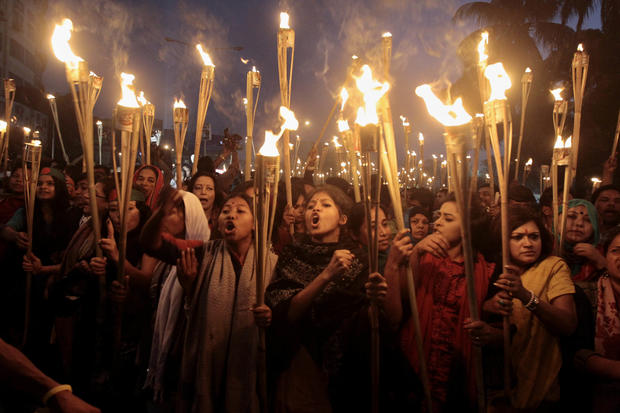Bangladesh opposition leader’s execution sparks deadly riots
DHAKA, Bangladesh -- The execution of an opposition leader in Bangladesh sparked violent protests Friday as activists torched homes and businesses belonging to government supporters, leaving at least three people dead, in a new wave of bloodshed ahead of elections next month.
Abdul Quader Mollah, 65, was hanged Thursday night for war crimes during Bangladesh's 1971 war of independence against Pakistan. The case has exacerbated the explosive political divide in Bangladesh, an impoverished country of 160 million.
Even as violence swept through parts of the country Friday, hundreds of people rejoiced in the streets of the capital, Dhaka, and said justice had been served.
In an editorial, the Daily Star newspaper congratulated Prime Minister Sheikh Hasina for trying and executing Mollah "40 long years" after his alleged crimes.
Mollah, a leader of the Islamist party Jamaat-e-Islami, was the first person to be hanged for war crimes in Bangladesh under a tribunal established in 2010 to investigate atrocities stemming from the independence war.
In Dhaka, Jamaat-e-Islami activists torched at least four cars and a motorcycle near the country's main railway station, said Shahzadi Sultana, a fire official. Several homemade bombs were detonated during the attack, Somoy TV reported.
Following the execution, a Jamaat-e-Islami leader, Makbul Ahmed, said in a statement that "people would take revenge on this killing by establishing Islam in Bangladesh, which is stained with the blood of Abdul Quader Mollah."
The party says Mollah's trial was politically motivated and an attempt to eliminate Islamic parties. Those who support the execution say he was hanged for serious crimes, and that the punishment had nothing to do with Islam.
Bangladesh says Pakistani soldiers, aided by local collaborators, killed at least 3 million people and raped 200,000 women during the nine-month war against Pakistan.
The case remains politically volatile because most of those being tried are connected to the country's opposition. Mollah was a key member of Jamaat-e-Islami, which is barred from taking part in next month's national elections. But the group is closely tied to the main opposition Bangladesh Nationalist Party.
Opponents of Jamaat-e-Islami say it is a fundamentalist group with no place in a secular country. Bangladesh is predominantly Muslim, but is governed by largely secular laws.
An analyst said the attempt to neutralize Jamaat-e-Islami could backfire.
"Jamaat-e-Islami as a political party has been in operation for long, so it's natural that it will hit back with what it has in its possession when you hit it in an extreme way," political analyst Ataur Rahman said.
Rahman said all-out efforts to destroy a political force could make it more radical.
The special tribunal convicted Mollah of killing a student and a family of 11, and of aiding Pakistani troops in killing 369 other people during the war.
The execution complicates an already tense political situation in Bangladesh, where the opposition has carried out violent protests, demanding an independent caretaker government to oversee the Jan. 5 general election.
The government rejected that demand. An opposition alliance led by former Prime Minister Khaleda Zia plans to boycott the vote. Weeks of protests have left nearly 100 people dead since October.